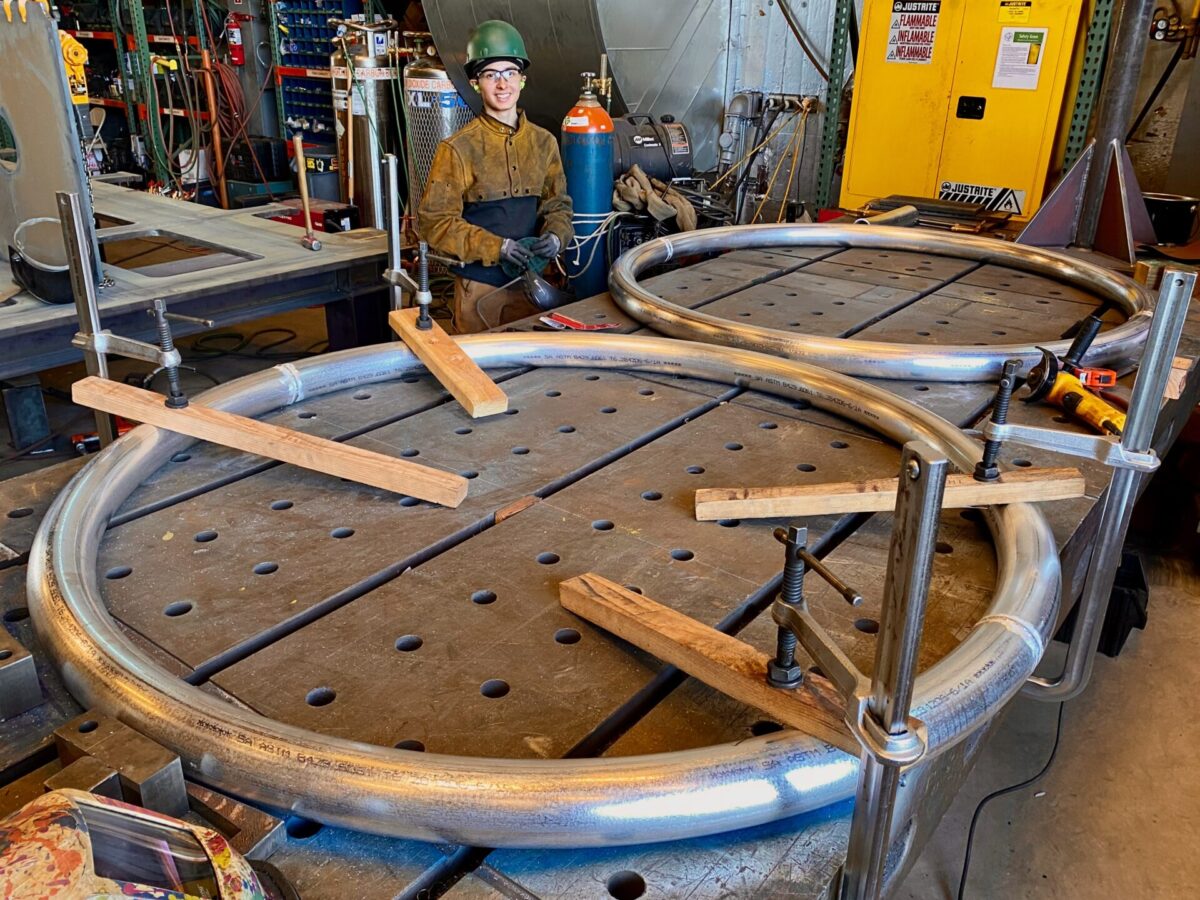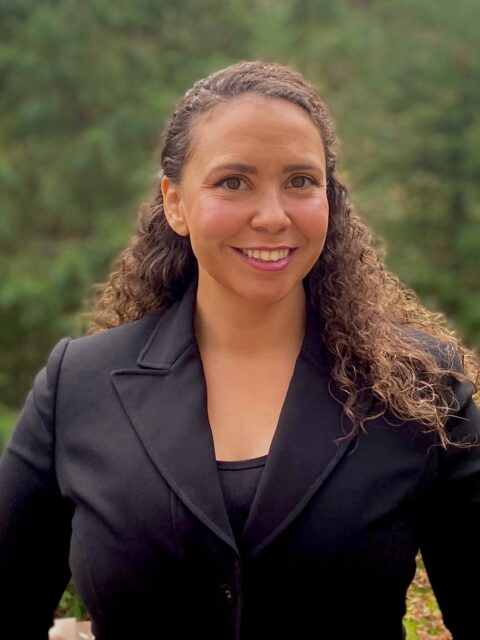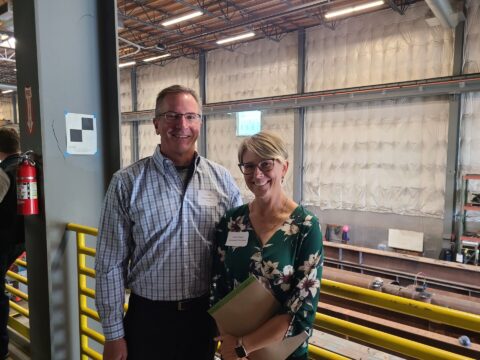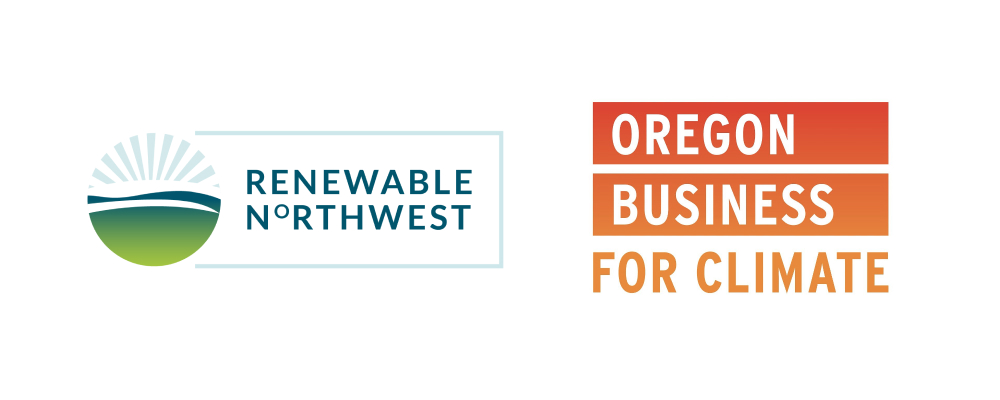
In September 2022, about 250 clean energy experts from around the world gathered in Portland, Oregon, for the Ocean Renewable Energy Conference. In a season when wildfire smoke choked the skies and families faced evacuations, Alicia Chapman, who co-owns a small manufacturing facility, told attendees why she’s putting her energy in clean energy.
“Clean energy offers so much for us all—hope for our planet, a healthy environment for communities, and thousands of new family-wage jobs here and around the country,” she said. Her company, Willamette Technical Fabricators, a women- and minority-owned business, expects to double in size as clean energy ramps up. The event was co-hosted by Renewable Northwest and Oregon Business for Climate, both Energy Foundation grantees.

The international clean energy delegation toured Chapman’s facility to learn more about what the company had to offer. They also shared why they were so eager to come to Oregon to discuss future prospects for offshore energy development.
“The whole world is trying to develop this sector. In the U.S., the state to go to is Oregon,” said Marcos Suárez Garcia, of the Basque Energy Cluster, an organization connecting energy innovators across Europe. “Companies, nonprofits, universities—everyone’s working together.”
Oregon Business for Climate has helped strengthen that cooperation, says the organization’s director, Tim Miller, by advocating for smart climate policies and programs. The group is a nonpartisan, nonprofit statewide organization focused on mobilizing industry support and business leadership to advance clean energy and climate policy in Oregon. In recent years, the state passed some of the country’s strongest climate goals, including a push for 100 percent clean energy by 2040.
“Oregon has had a platform of laws helping to usher in innovation and economic development,” Miller says. “Businesses are seeing the upside of addressing climate change, of course, and also economic opportunities in the transition to a clean economy.”
Now, he added, “federal winds are blowing in the right direction, too.”
Ensuring Oregon is front of the line to leverage Inflation Reduction Act (IRA) investments is a top priority for Oregon Business for Climate and the organization recently co-hosted an educational webinar with state lawmakers and the business community focused on 2023 climate policies with IRA front and center.
The IRA includes $370 billion for clean energy projects. It will not only help Oregon utilities make investments in clean energy, it also includes funding provisions targeting rural, low-income, and disadvantaged communities. Many see it as a once-in-a-generation opportunity for the region’s economy. Already, more than 56,000 Oregonians are employed in the renewable energy sector. On average, they earn 21 perceent more than the statewide median wage. And they’re largely employed by small businesses.
Businesses like Chapman’s. Willamette Technical Fabricators pays an average annual salary of $84,000, and offers training for newcomers to the field, including people of color, people impacted by the criminal justice system, and women. Nikola Klassen, for example, had no manufacturing experience, but thanks to on-the-job training, she recently became the company’s newest production welder. At age 25, her prior experience was in restaurant service and at Starbucks, neither of which offered the stability, benefits, or salary she needed.
“I wanted to have a career, something I can build on,” Klassen says.
Now, with the IRA, there will be even more opportunities for people like Klassen, and for businesses like Chapman’s.

“It’s huge,” says Nicole Hughes, executive director of Renewable Northwest, a regional clean energy advocacy organization. “With the IRA, there’s less uncertainty about tax credits and more opportunity for so many different industries.”
An Energy Foundation grantee since 1995, Renewable Northwest is a non-profit advocacy organization that promotes the clean energy transition in Oregon, Washington, Idaho, and Montana. Their collective goal is to speed the region’s efforts to decarbonize the electric grid while maintaining system reliability and affordable rates for customers. Energy Foundation’s work with Renewable Northwest focuses on policy and regulatory work as well as work on regional markets and grids and efforts connecting state and federal policy and funding opportunities.
Oregon is going to be ground zero for wave energy testing in the U.S., thanks to a $90 million research facility that will be completed over the next few years—part of the so-called “blue economy.” The public process and stakeholder engagement has begun for another major project: a floating offshore wind facility on the Oregon Coast. Other clean energy projects in the works include a hydro-powered storage battery for wind and solar energy in Klamath Falls and a solar project in Morrow County.
Speaking to the international delegation, Chapman made it clear: “Oregon is a center of excellence for the blue economy,” she said. “We want you to think of our state as the home for your next project.”
